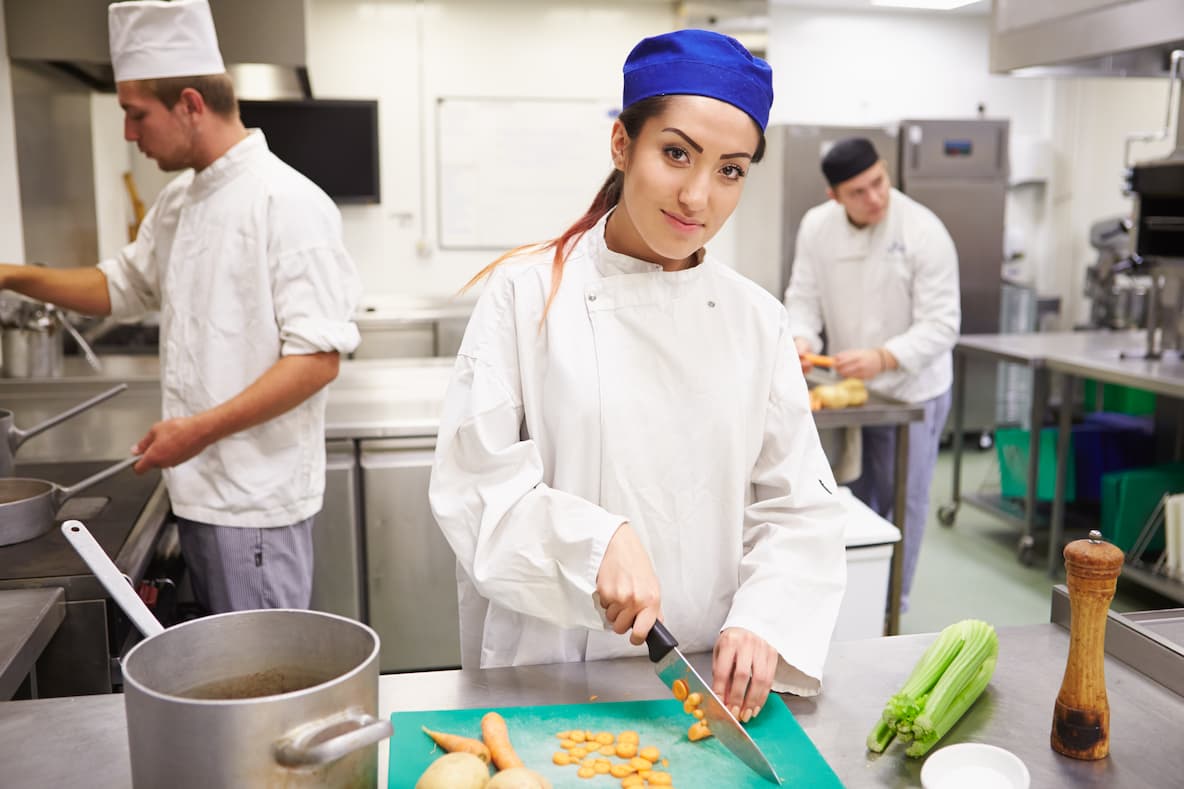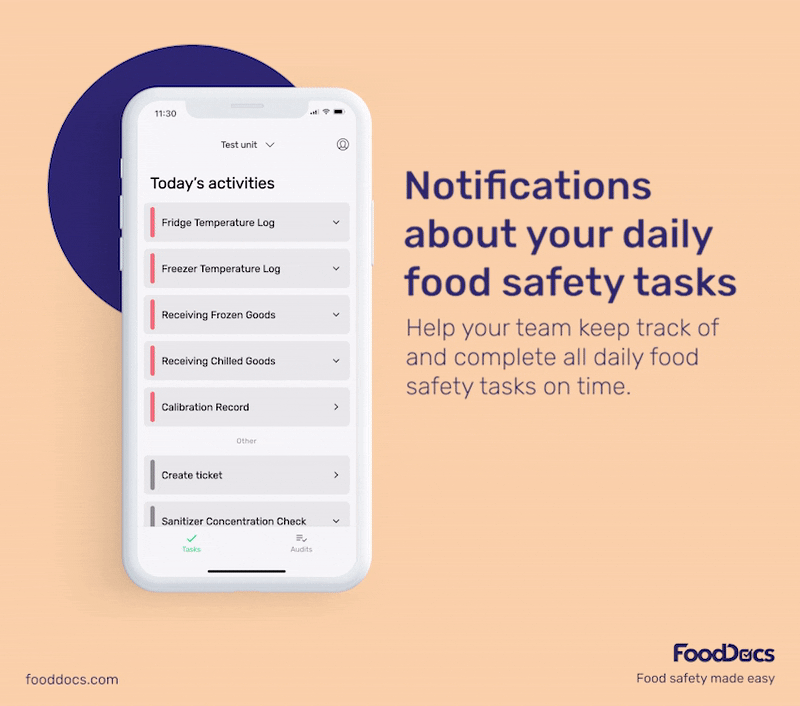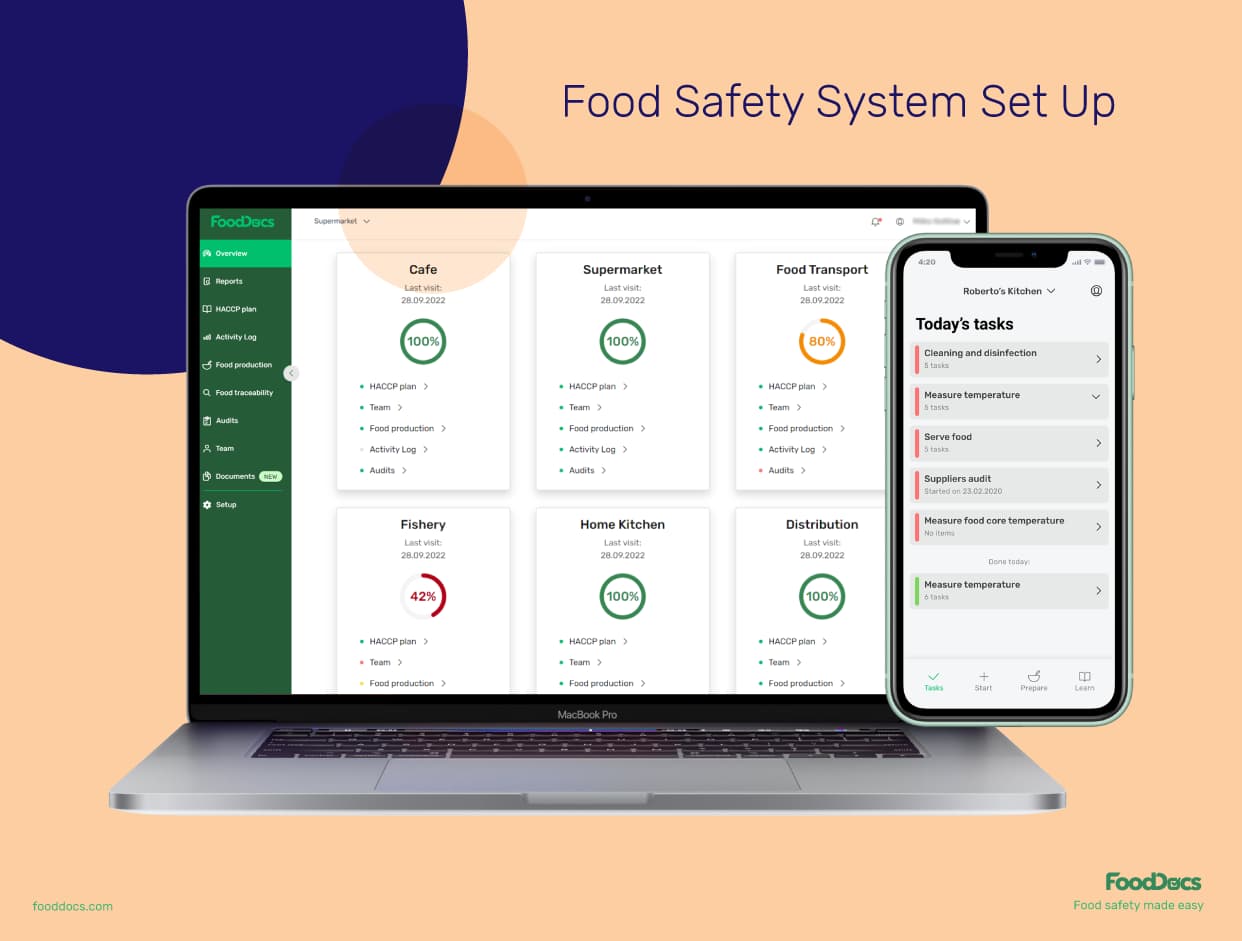Mastering Restaurant Sanitizing: Best Practices for Kitchens and Dining Areas
Master restaurant sanitizing with clear steps for kitchens and dining areas. Learn methods, checklists, and procedures to keep your team safe and...
Food safety managers or business owners are responsible for providing the necessary training on food handler training.
Food safety issues such as food poisoning, customer complaints, or food-related injuries can indicate poor food handling. Training food handlers in the principles of food safety is an essential task that must be done before sending an employee into any part of your food business.
While food handling training can be a pricey and time-consuming project for a business owner, poor food handling practices can cost you even more. The chance for outbreaks to occur is higher with an unprepared team. The question is, "Who is responsible for training food workers on safe food handling procedures?"
Key takeaways
Food safety managers or business owners are tasked with providing necessary training on food handling procedures for their employees.
Training food handlers on safe food handling procedures is essential and required for all food workers.
Adequate knowledge of food safety guidelines can significantly reduce the likelihood of foodborne illness outbreaks.
Constant monitoring of food handling practices is crucial for assessing the proficiency of food workers.
Food safety issues such as food poisoning and customer complaints are indicators of poor food handling.
Proper food handling training can be costly, but it is less expensive than the consequences of poor food handling.
The responsibility for training food workers on safe food handling procedures lies with the food business owner or manager.
Providing basic and advanced training for food workers is necessary for any food business to demonstrate their commitment to food safety.
A study has shown that food handlers who received proper training and supervision were more likely to practice safe food handling.
FoodDocs' food safety management software helps train teams on food handling and integrates food safety practices effectively.
Training food workers on safe food handling procedures is the task of the food business owner or manager. Before allowing them to operate in your food business, food handler training programs must be provided as a prerequisite to food safety compliance.
This food handler training program must include principles of food safety, such as:
All food workers are responsible for protecting customers from foodborne illnesses and related injuries. They must be well-equipped with knowledge in the application of food hygiene and the principles of food safety. This objective can be achieved by complying with food handling regulations and understanding the basis for food safety.
An authorized training professional or a health officer can provide more advanced training, including food safety laws in handling different food types. Food business owners or managers must ensure that every worker has enough food safety knowledge to serve safe food to consumers.
Depending on the organizational structure of a food business, the most commonly in-charge employee for food safety is the business owner or manager. In some cases, a food business owner hires another food safety manager to oversee workers with direct access to food products and initiate an increase in food safety.
The individual in charge of food safety for any business must ensure compliance with food laws requiring basic training for workers.
Food safety managers also monitor and evaluate while new food handlers are practicing a food safety procedure. Managers must guide food handlers in conducting proper food safety practices, such as monitoring correct temperatures for cooking raw foods and handling ready-to-eat products.
Allowing food workers to serve unsafe foods, such as unpasteurized milk or undercooked meat, puts public health at risk.
Food safety may be the entire team's responsibility, but the manager is responsible for overseeing and ensuring compliance and proper customer service.
Food handling refers to any operation that involves direct contact with food and emphasizes the safe preparation of products for public consumption. Food handling involves the following practices and basis for food safety:
Proper food handling by workers can determine the safety of the prepared foods. Cross-contamination can be significantly reduced when food workers understand the importance and basics of food handling and safety practices.

Skills and expertise in proper food safety practices can be obtained through various resources. Workers can apply their on-the-job training experience, knowledge from seminars, certifications from online food handler training programs, or other reliable free resources.
Other food businesses also conduct in-house training commonly facilitated by a certified individual.
Here are some of the most common ways that you can use to train food workers:
With countless food handling rules and regulations in the food supply chain, it may be difficult to remember everything. You can use visual tools such as posters and checklists that contain essential information as a basis for food safety guidelines.
Posters must be straightforward and accurate for easier identification and understanding. Use food safety posters with clear illustrations to help food workers understand them without reading long sentences.
Some of the most helpful food safety posters and advisories for food preparation include:
Visual tools are useful references for very specific tasks, such as when reading the internal temperature of raw foods during cooking. A few degrees off the target temperature and the risk of allowing pathogens, such as Salmonella Typhimurium, can significantly increase. Readily available visual tools can help food workers remember specific operations.
Several organizations offer free or paid training programs for proper food safety practices that provide accredited certification as proof of completion.
A great example is the food handler training programs offered by The Food Safety Preventive Controls Alliance. This public-private partnership with the FDA offers food handler training courses that comply with the essential food regulations of the U.S. government. Mandatory training contributes to better food safety outcomes.
Programs in training for food safety are often flexible and can be taken at your chosen time. Such programs provide written examinations to evaluate the ability of a food handler. Passing the exam will earn the certificate or permit.
A food safety management system implements a strict monitoring program that tracks the progress of food workers. You can use such a system to monitor particular food workers who are lacking in training and focus on them.
Food safety training is a continuous process. Over time, food workers who have already undergone training must receive refresher courses. Such programs aim to review food handlers with the fundamentals of food safety and update existing information with new ones.
Use our list of answers for the food handlers test to evaluate your food workers' knowledge. This free tool can serve as an onboarding training exam or a refresher program for new and existing employees, respectively.
Food safety training programs are often divided into several levels, varying in difficulty and depth. More advanced programs are usually provided to managers or supervisors, who then delegate the information to their teams.
Training programs are essential in building appreciation and increasing knowledge of food safety. When food workers have a good understanding of food safety principles, there is less chance of outbreaks.
Most adequate food safety training programs are offered in bundles. This means that topics are subdivided into levels of difficulty or other categories. When managers select programs, some topics may be distributed into different levels.
You can also strategize in selecting which training program is best by understanding the information that your business needs the most. Topics in food safety training can span a wide range of subjects under the food supply chain.
Here are some tips and pointers for training food employees:
Ideally, food workers must understand the most applicable food safety laws according to the Food Code. More advanced programs in the food chain must include a deeper knowledge of foodborne illness outbreaks, such as the most significant causes of foodborne illnesses, and go deeper in terms of strategizing operations.

In the United States, federal laws mandate food handler training requirements. Under the Food Safety Modernization Act of 2011, the Food and Drug Administration (FDA) requires that workers engaging in handling food ingredients and ready-to-eat foods must receive training and acquire adequate food safety knowledge.
Anyone who has access to food products in your food business must receive formal training. The FSMA training must include the principles of food hygiene and food safety.
In addition, the same law requires a food business team to appoint a properly trained and certified supervisor to oversee clean and safe food preparations. Active managerial control in operation promotes accountability within a team and an increase in food safety compliance.
The U.S. Department of Agriculture (USDA) requires food service directors to complete a total of eight hours of adequate food safety training. The specific food handler training requirement must then be renewed every five years to update information.
In different states of the U.S., local health departments and food safety agencies require a local food handlers card or food safety certificate. Such food regulations aim to teach food workers that food safety is a critical part of working in the industry.
Compliance with providing adequate food safety training requirements is a vital part of any food operation. Food safety training ensures that your employees who have access to food products know how to minimize the risk of food hazards and protect public health from harm.
While most principles of proper food safety practices may be considered common sense, undergoing a formal food handler training course solidifies the worker's knowledge. The program also enables food workers to understand why food safety is an important part of operating a business.
In particular, training programs for new employees provide the following benefits:
The lack of food safety knowledge is always a critical risk for a food business. For example, the simple unfamiliarity with adequate meat handling practices increases the risk of cross-contaminating the entire kitchen. Such cases have caused Salmonella outbreaks from ready-to-eat poultry meat products in the past.
The food industry is always tied to the risk of causing foodborne illnesses. One of the most effective ways to control and minimize this risk is to practice personal hygiene. The application of food hygiene ensures less risk and chance for contamination factors to cause food-related problems.
The most important hygiene practice for every worker in the food service industry includes the following food safety guidelines:
Since food workers are the fastest spreaders of agents of contamination, the application of food hygiene is a must. According to the WHO, the simple act of washing your hands properly can reduce the risk of causing deaths and the chance for outbreaks by up to 50%. This only shows the significant contribution of food workers and their food safety knowledge in controlling safety in the industry.

Poor food handling is always negative news for any business in the food supply chain. Whether you are in the food service, retail, catering services, or manufacturing industry, issues concerning proper food safety practices will surely affect your operations.
A majority of the recorded foodborne illness outbreak cases are attributed to bad handling of finished products and unsafe food. In addition to this problem, improper food handling can also lead to the following problems:
Serious violations of food regulations and loss of control often lead to negative effects on your company's brand. Such events will always lead to financial ruin or a significant drop in your sales. Understanding the principles of food safety through responsible training programs can help employees minimize problems.
Prevent food safety-related problems and impress your local inspector of food safety by establishing a comprehensive digital Food Safety Management System from FoodDocs. Get an intuitive notification system and smart prefill solutions to ensure compliance with food handling regulations.
While training programs are critical to providing knowledge on food safety, in-house training and monitoring are still important. Constant monitoring of safe food handling practices helps managers evaluate an employee's mastery level.
Digital solutions provide more convenience for managers in training food workers. The best example of a food safety digital solution is our digital Food Safety Management System. Our software can help managers efficiently train food workers while consistently monitoring their progress.
In just 15 minutes, you can easily set up your own digital Food Safety Management System that offers the following features:
Smart notification system

Smart suggestions
Educative instructions
-png.png?width=1417&height=924&name=Cooking_temperature%20(1)-png.png)
Role-based tasks
Control by verifying tasks
In addition to these features, our software also provides a real-time dashboard that allows food safety managers to track your team's everyday progress. This feature can help you save at least 20% of your time from supervising your team.

Switching to our digital platform is very easy and will only require for you to answer basic questions about your business. You can also further customize the generated monitoring documents to fit your operations perfectly.
Train your team and experience efficient compliance with food safety using our digital Food Safety Management System. Use our free 14-day trial to learn how our system can help your team.
Here are some frequently asked questions regarding the responsibility of training food workers.
A food handler is responsible for preparing, cooking, storing, and serving safe food to consumers. They are tasked to preserve the safety of a food business environment by maintaining clean working conditions that are free from agents of contamination.
Food handlers must always follow food safety guidelines to reduce the chance for contamination to occur and the risk of causing foodborne outbreaks.
The person in charge of food handlers and their operations is the business owner. In some cases, the business owner will designate an employee who is responsible for training food handlers and supervising the team.
The restaurant manager is responsible for providing training for food workers on handling procedures. Securing proper training is a legal requirement in the food industry.
Access to training about personal hygiene is a critical role for the food business owner or manager. All food workers must be aware of the essential hygiene practices to reduce the chance of contamination and protect public health.
Master restaurant sanitizing with clear steps for kitchens and dining areas. Learn methods, checklists, and procedures to keep your team safe and...
Learn challenges healthcare foodservice teams face today and key food safety practices to protect vulnerable patients. Get a free healthcare leader...
Learn what Standard Operating Procedures (SOPs) are and how to write effective SOPs that ensure consistency, efficiency, and safety in your...